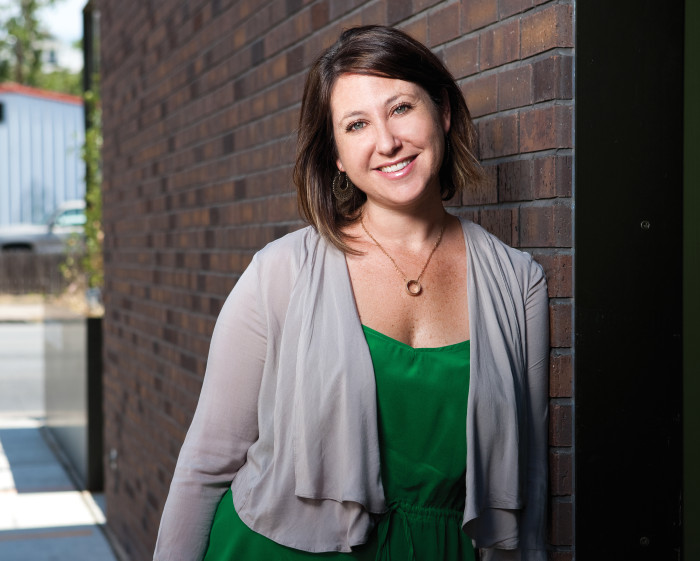Karen Gross and the people at the Anti- Defamation League are cracking down on all forms of discrimination.
Karen Gross is, in her own words, a talker.
But she’s also a pretty good listener. In fact, she’s downright inquisitive–ask her a question about herself, and before you know it, she may have turned the query around.
Combine those traits with her innate sense of community service, and you’ll understand why she gravitated to the Anti-Defamation League in Austin.
“I grew up in a family where giving back to the community was just how we were raised,” she said. “There’s a Jewish term that means ‘fixing the world’–in my family, volunteering was an obligatory thing we did. Giving back with not just your money, but your time, was something my parents implanted in all of us. That just stuck with me when I left the house.”
The political process, and engaging people in that process, motivates Gross. The University of Texas graduate got a chance to see that democracy in action while working for former Council Member Brewster McCracken before attending law school in Houston, where she wrote her legal thesis on the case for gay marriage. Although Gross is straight, she was fascinated by the legal arguments that have framed the movement toward equality in the LGBT community.
“I feel like discrimination against the LGBT community is the final frontier of the civil rights movement,” she said.
Now back in Austin, Gross is the community director at ADL Austin. An organization that has its roots in fighting anti-Semitism, the ADL now fights all forms of bigotry and prejudice nationwide. ADL Austin serves a wide area of southern Texas.
The organization works to combat bigotry through a series of programs that train educators, youth and the business community. In February the Human Rights Campaign awarded the ADL its HRC Equality Award, which recognized the organization’s No Place for Hate campaign, an antibullying program in the school system. It has long advocated for equal rights in the LGBT community and worked closely with it on an antibullying bill during the 2011 legislative session.
The organization also builds bridges through meetings and initiatives. One of those, The Hate Crimes Initiative, is a relatively new program and one that Gross said she’s particularly proud of.
That initiative came together after the downtown beating of two gay male softball players in February 2010.
“The response to the community was insufficient from us and from the APD,” Gross said. “It left people feeling vulnerable, left the community that was victimized feeling vulnerable, and left community leaders wanting to do more, but not sure what to do (in) a hate-motivated situation.”
Council members turned to the ADL after the attack for guidance on how to shape a call to action. For the ADL, Gross said, it was an opportunity to work with community stakeholders to get hate out of the community, both proactively and in response to specific incidents. A framework already existed, based on a 1990s mandate from the Department of Justice that built a dialogue about hate crimes.
Like the Department of Justice, the ADL knew that community stakeholders would be the key element to an effective initiative, Gross said. In December 2010, the Austin ADL, along with city and county officials, launched the Austin/Travis County Hate Crimes Task Force. From there, more than 70 people representing about 40 different organizations and departments formed what is now the Hate Crimes Initiative.
Next, the fine-tuning work began–figuring out structure, processes and scope of work. Recommendations on those details were endorsed in April of this year, and work groups are currently forming to develop specific strategies.
Research from the Texas Department of Public Safety shows that in 2009, the latest year for which data is available, 164 hate crime incidents were reported. That’s a drop from 2008, when 246 incidents were reported. Of those reported crimes, most were vandalism or “simple assault.” And the bias of those reported crimes was overwhelmingly either racial or related to sexual orientation.
“The conversations that are unfolding are meaningful and substantive. Every time I leave a meeting, I’ve learned something, and I feel like we’re making an impact,” Gross said. “And this is just the beginning.”
Work groups cover specific areas, ranging from response to legal structure. Gross said some laws related to hate crimes aren’t as strong as they could be, and she’s hoping to engage UT to do a policy assessment. In two years the group may have some proposed changes to laws to bring before the legislature.
The initiative is already gaining attention. When a father murdered his daughter’s partner and mother earlier this year, the Department of Justice’s community relations group contacted the ADL and attended one of the steering committee meetings of the Hate Crimes Initiative.
“They were very impressed and said what we were doing was what they would have suggested,” Gross said. “That was very affirming for us…. At the end of the day, if we can get communities to stand with each other before hate crimes occur and after, we’ll be more unified as a community.”




































